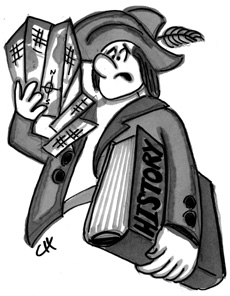Opinion: Real revisionist history

Chris Hampson
Oct 8, 2004
Last updated on May 11, 2016 at 04:13 p.m.
When most people think of Columbus Day, they think of barbecues and sales at the mall. I must be a huge dork, because I think of history. It makes sense, though; if Christopher Columbus had not gotten lost 500 years ago, there might not be a U.S. history to speak of.
In years past, it’d be my place to take the role of the indignant liberal and tell everyone what a horrible person Columbus was and how it’s a travesty that we have a holiday in his honor. Well, he was a greedy bastard who used God to justify his insatiable lust for gold and his enslavement of the Arawak Indians. But as I said, I won’t dwell on any of that.
The story of Columbus is just a small part of a larger phenomenon that infuriates me to no end. My account of Columbus would be described by many as revisionist history. Yet, when I hear the words “revisionist history,” I think about taking a historical event and changing the story of what actually happened.
I’m still unclear about why telling the whole story of Columbus is revisionist history. However, I’ve come up with one hypothesis.
Get The Daily Illini in your inbox!
Basically, revisionist history is when you look at history from the point of view of those who are out of power. We all know that history is written by the victors. This is especially true of U.S. history, in which every era is described as a tale of progress and wealth. Heaven forbid someone would tell the stories of those left behind by U.S. capitalism.
The Bible for “revisionist historians” like myself is Howard Zinn’s The People’s History of the United States. As Matt Damon’s character in Good Will Hunting said, “That book will knock you on your ass.” In it, Zinn tells the story of U.S. history from the point of view of the common people. Some of the better chapters cover labor strikers – who had their protests violently broken up by the National Guard – and teenagers drafted to fight in Vietnam.
Accounts of history that focus on the lower rungs of society are condemned as revisionist history, because they do not fit the accepted mold of U.S. history. U.S. citizens are taught a brand of history that could be described as hero worship. The leaders of the past are presented as flawless individuals whose benevolence gave us all the great accomplishments we celebrate today.
Take for example Abraham Lincoln, whom mainstream historians credit for single-handedly freeing the slaves – thus ignoring years of struggle by the abolitionist movement.
I find this type of distortion offensive. Historians have an obligation to objectively tell the whole story. Real revisionist history is what we are taught in grade school – a history of exaggerations and half-truths. Although it is difficult to accept that the United States has had its darker moments, understanding them is a key part of understanding the American character.
I’ll be honest. History is something sacred to me. Like basketball, it is kind of a religion.
Thus, it pains me to see hero-centric revisionist history used as propaganda for the status quo. Students are taught they owe everything they have to their great leaders, who frequently happen to be rich white and male.
Disagree? Look at this election. We’re counting on two rich white men to make good on promises to help us.
Why does my beloved history have to be used by The Man to hold down the people? Why does anyone who tries to tell the story of common folk have to be labeled a revisionist historian? Maybe if people stop throwing the words “revisionist history” around without really knowing what they mean, U.S. students would have the opportunity to learn a little more about the power they have in this democracy.
Zachary Schuster is senior in engineering. His column runs whenever he wants. He can be reached at [email protected].





